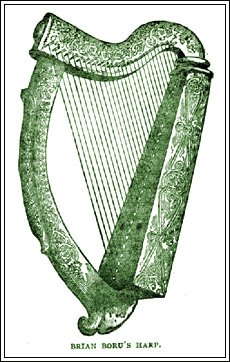As a follower of the Celtic Wheel of the year, I always love the coming of Imbolc as it signals the beginning of Spring. Traditionally Imbolc is celebrated on February 1 to honor the Celtic Goddess Brighid, but the celebration sometimes is noted on February 2, Candlemas in the Christian Calendar.
As Brighid was considered a goddess of creativity and poetry, among many other attributes, I have adopted her as my Goddess of Harping. Granted, St. Cecelia is more often considered the Saint or Goddess of music, but I prefer Brighid or Bride any day.
Here are some wonderful images of her, including her Christian persona as St. Brigid.


ST. BRIGID AND THE HARPS.
It was not in the nature of things that a Celtic saint should despise music or poetry. St. Brigid being once on a journey, sought hospitality for herself and her sisters in the lios of a petty king. This king and his chief officers, including his harpers, were absent, but some of his sons did all that religious reverence and a hospitable spirit could for the suitable reception of their honoured guests. After a frugal meal the hosts and guests continued an interesting conversation, during which Brigid, observing the harps suspended on the wall, requested the princes to favour her with some of the ancient melodies of the country. "Alas, honoured lady!" said the eldest, "our father and the bard are absent, as we have mentioned, and neither my brothers nor myself have practised the art. However, bless our fingers, and we will do all in our power to gratify you." She touched their fingers with the tips of her own, saying some prayers in a low voice; and when the young men sat down to the instruments, they drew from them such sweet and powerful melody as never before was heard in that hall. . So enthralling was the music that it seemed as if they never could tire of playing, nor their audience of listening. While the performance was still proceeding the king and his suite entered the large hall, and were amazed at hearing sweet and skilful strains from the untaught fingers of the princes. Recognizing the saint and her daughters, their wonder ceased. The gift was not conferred for the occasion, for the princely performers retained their power over the harp-strings while they lived.

Carer of the earth
The feast of St Brigid on the first of February is a celebration of the wonderful springing back of the earth from its winter sleep. It is the season when we celebrate new beginnings and new life on earth. The sod is turned. The day lengthens. Seeds are sown and sails are hoisted.
Many of the stories about Brigid tell of her milking the cows, churning the milk, making up the firkins of butter, shepherding her flocks of sheep, helping with the harvest and even brewing the ale!
Brigid, in keeping with her Celtic traditions, was wonderfully attuned to the seasons and cycles of nature. She valued the elements of nature: earth, air, fire and water.
Wishing everyone a Merry and Blessed Imbolc,
Duncan

No comments:
Post a Comment